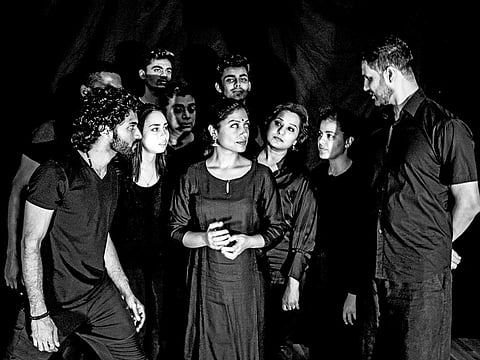‘Sutradhar’ in Dubai: A twist on India’s ‘Mahabharat’
The show is based on a preamble to the main events in the Indian epic ‘Mahabharat’

The cannons fire, a coin is tossed: Let the games begin. Two sides at war, one attacker, one defender — who is right? And is it the one who loses who will really suffer or will those who depend on the defeated?
“What is right and what is wrong is a point of view, isn’t it?” says Sanjeev Dixit, writer and director of Sutradhar, ahead of the play’s debut at the Junction, Al Serkal Avenue on November 15.
The show, based on a preamble to the main events in the Indian epic Mahabharat, explores the interplay between fate and choices. “I’m trying to retell a character we all know from the Mahabharat in a different light; maybe the decisions we make and the things people go through influence their choices later in life,” he says. Or perhaps there is a puppet master, or sutradhar, that is manipulating things behind the scenes. “At least in Mahabharat, the idea is someone always pulls the strings,” he says.
What’s the story?
The tale begins with a kingdom under siege and considering surrender — the peace deal must be sealed by blood; through a wedding. But what about the hapless princess who might find herself bound to a person she doesn’t care about — can she even refuse the match?
“They [the warring factions] form like a term of agreement, and that was very interesting to me, because, how does that person feel where they don’t have that agency to make that decision for themselves (who to marry), and they have to go along with it because it’s the done thing?” says Dixit.
Now and then
Dixit draws parallels between the propaganda that rushes through social media these days and the grapevine gossip that influenced decisions and swayed opinion in times gone by. The story — of moulding mass opinion through little nudges in the ‘right’ direction — will always be relevant, always contemporary, he explains. The difference is only in context.
It’s much like the human condition. Sutradhar deals with conflicts of personalities and what drives people to do what they do. And how, “we use what we think is right to essentially get what we want. The more powerful the people the more they exercise their will over people who are swayed by it,” he says.
Techniques
Sutradhar is an experimental venture in a way, for it employs elements of Greek theatre and Indian natyashastra (art form) to tell its tale. “I’m using the chorus as the natashastra rasas (which is basically the expression of the nine emotions) as a chorus. So we are finding emotional context to the characters express through the rasa,” he explains.
And there is music — borrowed from Japan’s Noh tradition; with a flautist and percussionist on stage. But these are storytelling techniques that have “been around for thousands of years”, explains Dixit, for both the uninitiated and the confused,
He recalls precious moments during rehearsal where things jotted down on paper were translated onto stagecraft. That aha moment when your cast understands the trick that makes a line, an act or a thought work. When the coin that he tossed up came down and he won.
In this case, the puppet master is always in charge.
Don’t miss it!
Sutradhar runs at the Junction, Al Serkal Avenue, from November 15-17. Tickets start at Dh100.
Sign up for the Daily Briefing
Get the latest news and updates straight to your inbox



